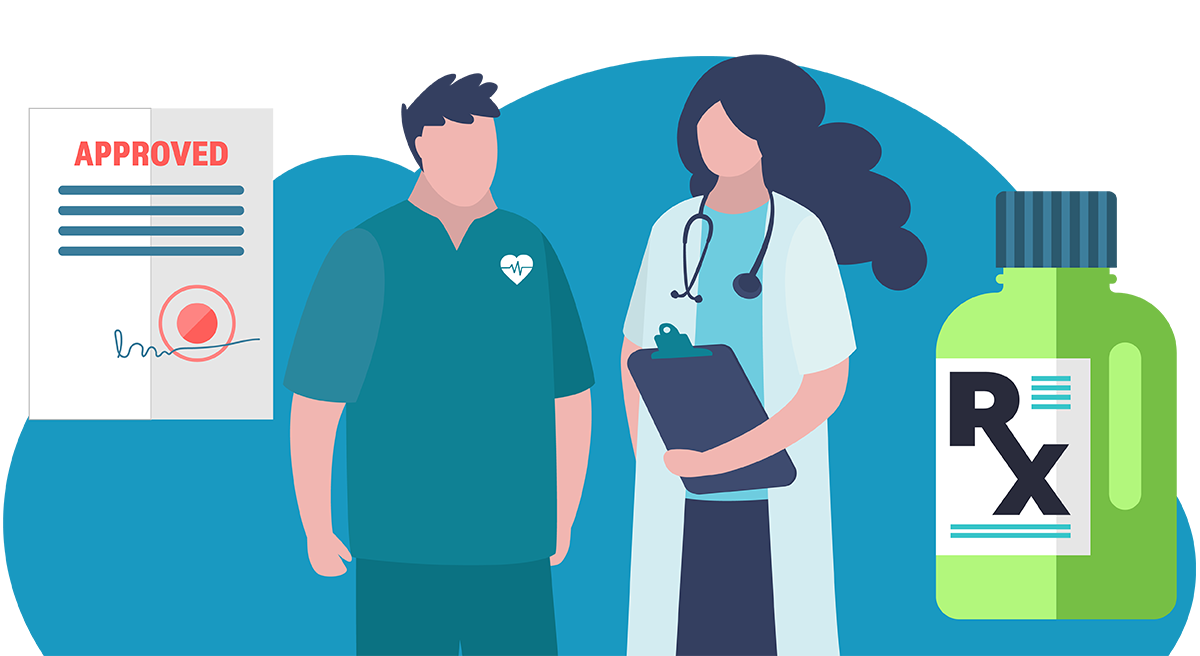Medication Management
Prescription Weight Loss Medications

If you are an adult with a serious weight problem and have tried, without success, to lose weight with diet and exercise, a prescription weight loss medication may be a good option for you.
Prescription weight loss drugs are FDA-approved medicines that only a healthcare provider can prescribe. These drugs cannot be bought off the shelf in a drugstore.
Newer medical weight loss medications have expanded prior options for treating obesity and have brought hope to many individuals struggling with obesity and type 2 diabetes.
The use of weight loss medications, such as injectables and other oral medications, should always be carefully evaluated, prescribed, and monitored by a healthcare professional.
Who can take weight-loss medications?
Weight-loss medications are typically recommended for people who have:
- Body mass index (B.M.I.) greater than 30
- BMI greater than 27 with serious medical problem(s) linked to obesity, such as type 2 diabetes, high blood pressure, joint pain, or sleep apnea
Weight-loss medications should not be used by:
- Pregnant woman
- Women trying to get pregnant
- Women breastfeeding
- Certain medical conditions specified by your healthcare professional
Weight loss drugs should be used in conjunction with:
- A healthy diet
- Regular exercise
- Lifestyle changes to achieve sustainable weight loss
It is always recommended that you have a medical consultation before starting any type of weight loss medication, including over-the-counter treatments.
How effective are medical weight-loss drugs and diabetes medications for weight loss?
Not everyone responds the same way to any particular drug. Some people may lose a lot of weight on a certain drug, while other individuals may lose very little or none. Therefore, if you do respond well to one drug, you may do very well with another. It often requires patience and a willingness to try multiple medications with the oversight of your healthcare professional to find the one that is right for you.
Prescription weight-loss drugs that are used for more than 12 weeks are referred to as long-term use medications. These long-term use drugs have proven to lead to major weight loss compared to programs and treatments that do not include medicine. The combination of weight-loss medicine and lifestyle changes can lead to greater weight loss than lifestyle changes alone do.
Taking weight loss drugs for a year can result in a loss of total body weight of 3% to 12% more than weight loss with lifestyle changes alone. Losing 5% to 10% of your total weight and keeping it off can have important health benefits.
5%-10% of weight loss can result in:
- Lower blood pressure
- Lower blood sugar levels
- Lower levels of fats (triglycerides) in the blood
Are there side-effects from weight-loss drugs?
Weight-loss drugs may cause mild side effects in some people such as nausea, constipation, and diarrhea. These side effects may lessen over time. Rarely, serious side effects can happen. This is one of the reasons why it is very important to work with an experienced healthcare professional who can choose the best medications for you based on your medical history and the possible risks and benefits of each drug.
How will a healthcare professional decide which weight loss drug is right for me?
Before choosing a weight loss medicine for you, a healthcare professional will take into consideration your:
- Medical history
- Any medical conditions
- Your unique weight loss challenges
- Your medical risks for being overweight
- Your individual goals
How long will I have to take a weight-loss drug?
How long you take a weight-loss drug depends on whether the prescribed drug is proving effective in helping you lose weight. If you are losing enough weight to improve your health and you are not experiencing any serious or terribly bothersome side effects, your healthcare provider may suggest that you take the drug long-term.
However, if you have not lost at least 5% of your body weight after taking the full dose of a drug for 3 to 6 months, your healthcare provider will probably change your medication and treatment plan by switching you to a different weight-loss drug.
Generic & Brand-Name Options
Wide variety of options available based on your medical conditions and insurance coverage
What drugs have been approved for weight loss by the FDA?
The medical weight-loss medications below have been approved by the U.S. Food and Drug Administration (FDA) for long-term use:
- Bupropion-naltrexone (Contrave)
- Liraglutide (Saxenda)
- Orlistat (Xenical, Alli)
- Phentermine-topiramate (Qsymia)
- Semaglutide (Wegovy)
- Tirzepatide (Mounjaro/Zepbound) is currently approved for Type 2 diabetes; pending approval for weight management
Most of these prescription weight-loss drugs work by making you feel less hungry or making you feel fuller. Some of these medications do both. The exception is orlistat. Orlistat affects the way your body absorbs fat.
None of these prescriptions below should be considered a substitute for a healthy diet and exercise program. All these weight loss medications should be used in conjunction with a lifestyle modification program and should always be overseen by a healthcare professional.
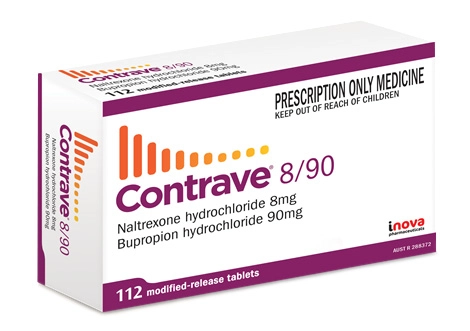
Bupropion-naltrexone (Contrave)
Bupropion-naltrexone is a combination medication used for weight loss in adults who are overweight or obese. It is sold under the brand name Contrave.
When used together, bupropion and naltrexone help to reduce food cravings and increase feelings of fullness which can lead to weight loss by a reduction in one’s calorie intake. Bupropion-naltrexone is not recommended for individuals with uncontrolled high blood pressure, seizure disorders, or a history of an eating disorder.
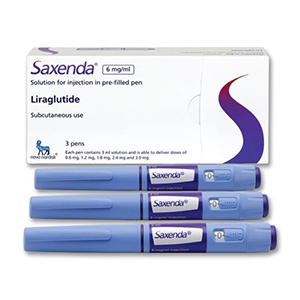
Liraglutide (Saxenda)
Liraglutide is a medication used to manage type 2 diabetes and obesity. It is sold under the brand name Victoze and Saxenda and is administered as an injection once a day.
Liraglutide works by mimicking the action of the natural hormone GLP-1, a hormone produced in the intestines that stimulates the release of insulin from the pancreas after a meal. By mimicking GLP-1, liraglutide helps lower blood sugar levels in people with type 2 diabetes, and it has been found to help people lose weight by reducing hunger and increasing feelings of fullness.
Nausea is a common complaint with liraglutide so vomiting may limit its use among some individuals.
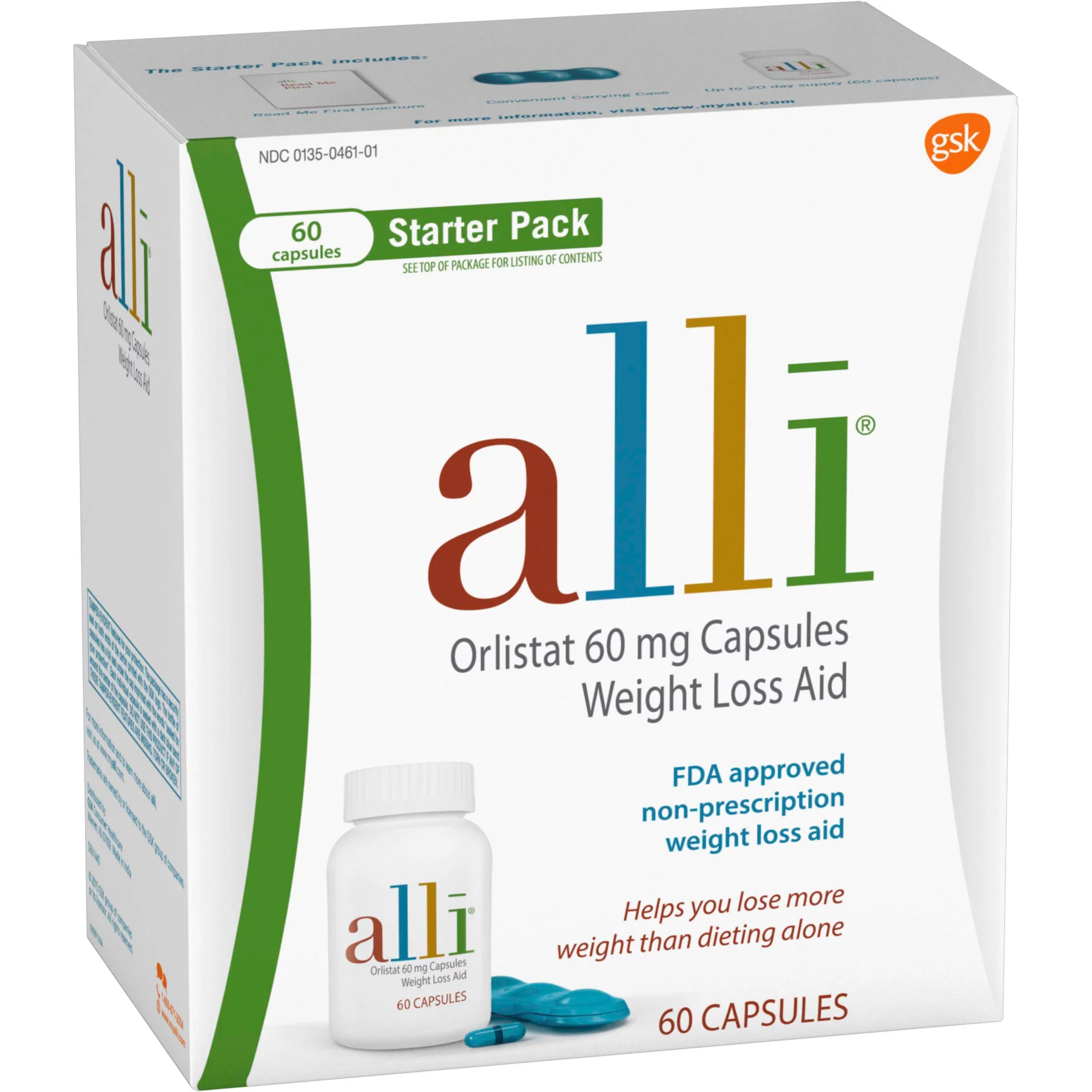
Orlistat (Xenical, Alli)
Orlistat aids in weight loss by blocking the absorption of some of the fat you eat, reducing the number of calories you absorb from foods.
Orlistat is available in both prescription and over-the-counter forms. The prescription form is typically taken 3x a day with meals, while the over-the-counter form is taken with meals that contain fat.
Some of the side effects orlistat can include gastrointestinal issues such as bloating, gas, and diarrhea. It is important to follow a low-fat diet when taking this medicine.
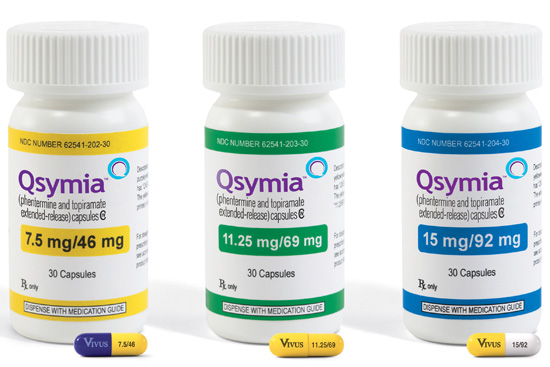

Qsymia (phentermine-topiramate)
Phentermine is an appetite suppressant that works by stimulating the release of chemicals in the brain that control appetite and thus helps reduce hunger.
Topiramate is used to treat epilepsy and migraine headaches. However, it has also been found to have weight-loss benefits. It can help reduce food cravings and increase feelings of fullness.
Together, phentermine and topiramate are believed to work synergistically to promote weight loss.
Possible side effects include increased heart rate and blood pressure, insomnia, constipation, and nervousness. Topiramate increases the risk of birth defects.

Semaglutide (Wegovy)
Semaglutide is a medication used to treat type 2 diabetes. It belongs to a class of drugs called GLP-1 which works by mimicking the action of GLP-1 in the body that helps regulate blood sugar levels.
Semiglutide is administered by injection once a week and is approved for use in conjunction with diet and exercise to reduce weight. It is available under the brand name Ozempic.
Its side effects can include nausea and vomiting, diarrhea, belly pain, headache, and tiredness, making it less ideal for some people than other drug options.
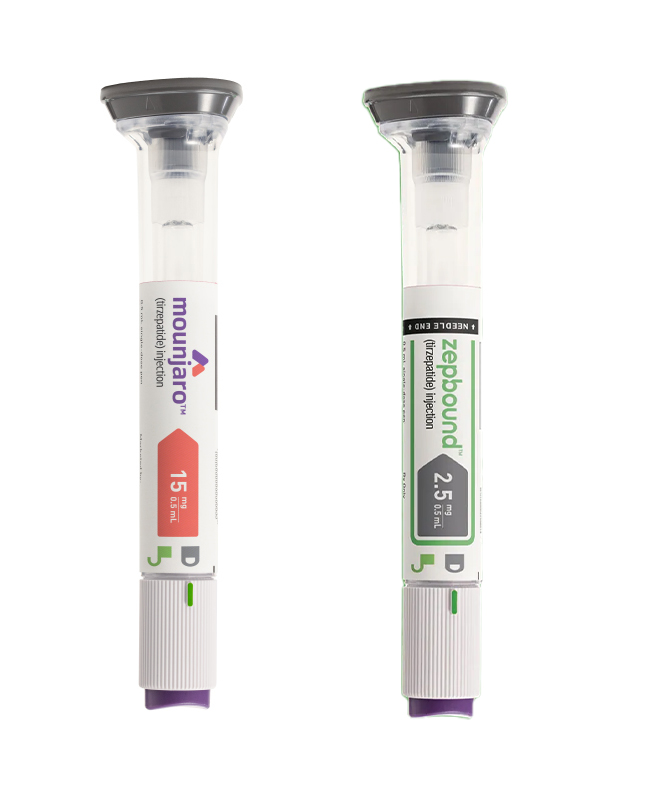
Tirzepatide (Mounjaro/Zepbound)
Mounjaro is a medication used to treat type 2 diabetes, and was FDA approved and widely available in the United States in May 2022. The drug’s active ingredient, tirzepatide, has also been used off-label to treat obesity. In November 2023, the FDA approved a weight loss version of the drug, called Zepbound, which also contains tirzepatide. Zepbound is intended for adults who are overweight or obese and have at least one weight-related condition.
Liraglutide, Semaglutide, and Tirepatide all belong to the same class of medications that mimic the action of GLP-1 in the body to help reduce hunger and regulate blood sugar levels. All three are administered as an injection, which is daily with Liraglutide and weekly with Semaglutide and Tirepatide. Although they are in the same class of medications, patients often respond differently. A patient may have little success with one drug, but have excellent weight loss on another. Finding what weight loss medication is best for you is a process that requires the oversight of your healthcare provider.
Tips for taking weight management medications
- Always follow your health care professional’s instructions about weight management medications
- Only buy your medication from a pharmacy or online distributor approved by your healthcare professional
- Know the side effects and warnings before taking any medication
- Take weight management medication in conjunction with a healthy eating and physical activity program
- If you are not losing weight after 12 weeks on the full dose of your medication, ask your healthcare professional whether you should stop taking it
- Be sure to share with your health care professional any other medications you are taking, including supplements and vitamins, when considering weight management medications
- Never take weight management medications during pregnancy or if you are planning a pregnancy
What everyone needs to know about medical weight-loss medications
Weight-loss drugs are not a magic pill, but they may help you lose weight effectively and get started in making the lifestyle changes needed to keep lost weight off and improve your health.
Weight-loss drugs can be expensive and are not always paid for by insurance. Ask your insurance company about your particular coverage.
Many people gain back some of the weight they lose using weight-loss medications when they stop taking the drugs. But practicing healthy lifestyle habits may help limit weight gain.
Sources:
- Centers for Disease Control and Prevention, https://www.cdc.gov/.
- Mayo Clinic, https://www.mayoclinic.org/.
- Johns Hopkins Medicine, https://www.hopkinsmedicine.org/health.
Are you ready to start down the path to a healthier you?
Prevent, reverse, or manage a chronic disease?
Take control of your health today. Better health IS within your reach.
Take the first step today. Call us today @ (919) 354-7077
Take The Stress Out Of Prior Authorizations
We will work with you, your insurance company, and pharmacy to get your medication needs met.
